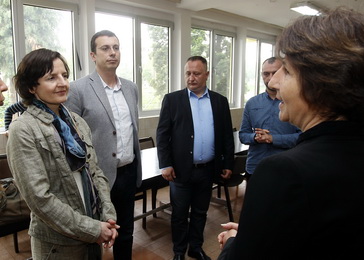 Director of the Swiss Cooperation Office Ursula Läubli, together with the Mayor of Doljevac, Goran Ljubić, has visited the works on the construction of the green market in Pukovac. This project worth almost 200,000 Euros is supposed to contribute to creating better conditions for agricultural producers from Doljevac and its surrounding municipalities for the sale of their products, while providing secure product placement, and an opportunity to generate higher incomes.
Director of the Swiss Cooperation Office Ursula Läubli, together with the Mayor of Doljevac, Goran Ljubić, has visited the works on the construction of the green market in Pukovac. This project worth almost 200,000 Euros is supposed to contribute to creating better conditions for agricultural producers from Doljevac and its surrounding municipalities for the sale of their products, while providing secure product placement, and an opportunity to generate higher incomes.
“In addition to the economic empowerment of agricultural holdings, and benefits for the entire population of Doljevac, it is very important to us that the municipality has given due attention to the rules which will regulate the operation of the green market, thus contributing to the observance of the good governance principles and greater accountability and transparency in the work of the local self-government,” said Director of the Swiss Cooperation Office Ursula Läubli.
Pursuant to these principles, the Doljevac Municipal Assembly has adopted the Decision on the Green Market Rules, while the Supervisory Board of the Public Utility Company has passed the Rulebook governing the manner of renting and using stands at the green market. These acts govern the methods for determining prices and assigning and renting out market stalls, as well as the manner in which the collected funds will be used.
According to Mayor Goran Ljubić, the works are at the final stage, 2,000 square meters of the green market area has been roofed over and developed, and the putting up of market stalls is under way. Ljubić added that this would boost the competitiveness of the local economy based on agricultural production, and stressed that there are over 3,800 agricultural holdings in the Municipality of Doljevac.
In Doljevac, the Director of the Swiss Cooperation Office also attended the signing ceremony for the contract on the delivery of training at the factory “Leoni Wiring” for another 60 people from vulnerable groups. So far, with the joint support of the Government of Switzerland and the EU aimed at social inclusion of vulnerable groups by increasing their employability through the organisation of vocational training, 100 people in Doljevac have successfully completed training courses, and 88 of them, mostly women and persons under 30 years of age, have been employed by the company Leoni.
The EU and the Swiss Government have supported the implementation of such projects in another ten municipalities in the European PROGRES area of responsibility, where 330 people are expected to successfully complete trainings, and about 200 are expected to get a job, thus also contributing to the reducing the gaps between supply and demand at the local labour markets.
Earlier during the day, the Director of the Swiss Cooperation Office visited the works on the completion of the Dialysis Centre within the Health Centre in Lebane, for which the EU and the Swiss government have allocated almost five million dinars. After the completion of the works, patients from Lebane, Medveđa and Bojnik who suffer from kidney diseases will no longer have to travel to Leskovac for dialysis; instead, the necessary medical service will be available to them at the Lebane Health Centre.
In addition to the finalization of construction works, electrical wiring, ventilation and air conditioning of the premises, the Community Health Centre, with the support of the European Union and the Government of Switzerland, also received part of medical equipment for the future Dialysis Centre, which comprises a defibrillator, an electrocardiograph (ECG), a monitor for patients, eight beds and one dry-heat sterilizer, all of which will contribute to the Centre’s operation at full capacity, while two doctors and eight nurses have undergone all the necessary training.
In Lebane, Ursula Läubli, Director of the Swiss Cooperation Office, visited the “Radanska Ruža”, the first social enterprise in the Jablanica District, which was established with the funds of the European Union and the Government of Switzerland through European PROGRES and employs women from marginalized groups. After the first year of its operation, the number of women from Lebane having permanent jobs in the “Ruža” increased threefold and now there are 15 of them, while another 20 women are engaged occasionally. They produce pickled winter food, thus generating income for both themselves and their families.
As assessed during the visit, such partnership projects of civil society organizations and local self-governments constitute the basis for good governance, while contributing to systemic solutions of issues affecting the quality of life of citizens.
Izvor: www.europeanprogres.org
 Government of the Republic of Serbia
Government of the Republic of Serbia



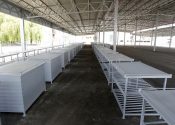

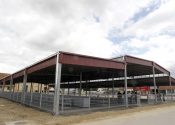
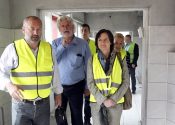
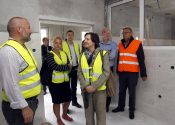
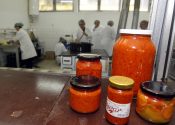
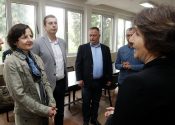
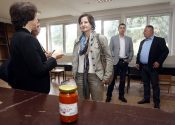
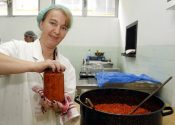












 pdf [271 KB]
pdf [271 KB]
Leave a Comment